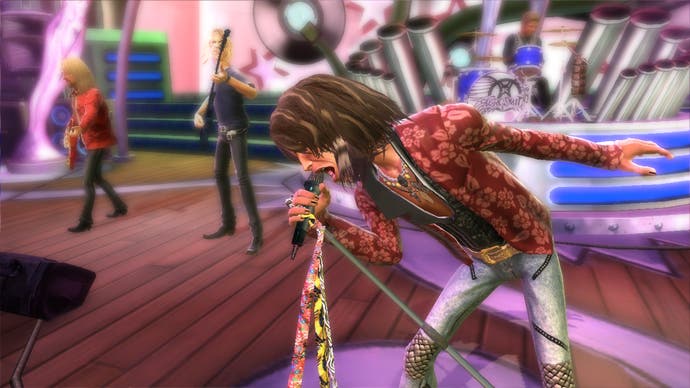Guitar Hero: Aerosmith
Hero protagonists.
Guitar Hero's history may not be as long and storied as Aerosmith's, but the young music game's popularity and commercial success has propelled the series to comparable stardom: North American sales alone are worth over a billion dollars; the band who wrote the third game's end song, Dragonforce, enjoyed a 126 percent spike in CD sales the week after the game came out; and there's even a whole South Park episode about it. Spin-offs, then, were inevitable, and Guitar Hero: Aerosmith aims to be the benchmark.
Making a game about a band isn't a completely new idea, but making a good one would be, as Aerosmith themselves can attest - what with Midway's mid-'90s arcade shooter Revolution X lurking rubbishly on their collective CV. This is nothing like that, thankfully. Instead it's an opportunity to play along to Aerosmith's career while learning a bit more about it and glorying in loving details: unlocking Joe Perry's custom-made 1964 SG Special, for instance, or being able to play through the Run DMC-assisted and vanilla versions of the crowd-pleasing "Walk This Way".
To this end the core of the game is a 31-song Career mode (with ten more tracks unlocked in a shop) that takes you through a series of venues that meant something to the band. The first venue, Nipmuc Regional High School, was their first gig; The Orpheum is a theatre that holds special significance; and the Half-Time Show is based on Superbowl XXXV, when Aerosmith performed alongside 'N Sync and had to watch the stage - in the words of awestruck band-members - erected and torn down in the space of six minutes. The trivia's related through quick-fire sound-bites from video interviews, which are sewn together rather over-zealously to avoid breaking the pace of the game progression, and viewed between the six tiers of mostly five songs apiece that are unlocked in clumps.

Ignoring the videos (and the load-screen trivia), it's basically Guitar Hero III with different songs: there are four difficulty settings, and the most difficult won't let you make any progress until you've beaten all the songs in your current tier. Despite following the band to the '90s with venues, though, the music focuses most on the '70s, with the exception of songs like "Love in an Elevator" and "Pink" (an unlockable track). There's also a smattering of songs by other artists to mix things - most notably "Always on the Run" by Lenny Kravitz, "Complete Control" by The Clash and office favourite "She Sells Sanctuary" by The Cult.
The game lives or dies based on your fondness for Aerosmith, but specifically your desire to play along to their songs. Elsewhere the fan service is competent, but it wouldn't sell on its own: you can unlock more extensive versions of the interview montages used in Career mode, and they're interesting but also a bit ponderous and "what did you do in the war, Granddad?" We've not read it, but the band's 1999 autobiography is probably a better destination if you want to do more than stare in horror at Joe Perry's amazing face.


